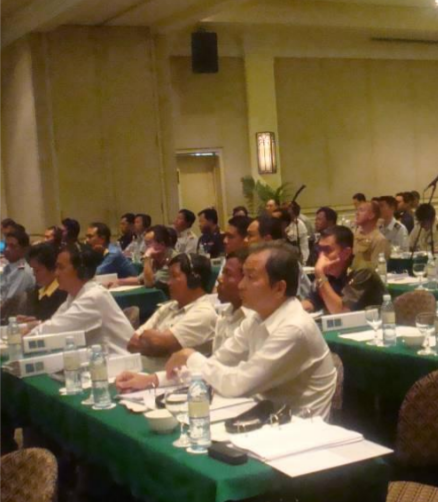
The IDRL Guidelines are finding their way into training courses and policy development carried out by military actors in the Asia-Pacific region.
The Center for Excellence in Disaster Management and Humanitarian Assistance (COE) is a U.S Department of Defense organization whose mandate includes promoting effective civil-military management in international humanitarian assistance, disaster response and peacekeeping through education, training, research and information programs. COE conducts education and training with military forces, primarily in the Asia-Pacific region, on how to coordinate the use of military and civil defense assets (MCDA) to support a civilian-led response to disasters and other humanitarian crises.
Within its courses, the COE informs course participants about the tools and resources available to actors responding to humanitarian crises. These courses now include specific instruction on IDRL, its origins and why the IDRL Guidelines were developed.
Bobby Ray Gordon, Humanitarian Operations Advisor for the COE, sees great value in the IDRL Guidelines as a means to improve consensus and understanding in disaster response. “Initiatives like this are crucial for building bridges and ties among the various actors involved in international disaster response - civilian and military alike”, Gordon said.
Multinational Force SOPs
The COE has also been supporting U.S. Pacific Command military exercises involving humanitarian response components, such as Cobra Gold and Tempest Express, and has been involved in the drafting of procedures for Humanitarian Assistance and Disaster Relief in the Multinational Forces Standard Operating Procedures (MNF SOP). The MNF SOP is a development of the MPAT (Multinational Planning Augmentation Team) Program, a cooperative effort by 33 nations around the world to improve multinational military responses in a wide range of areas.
The IDRL Guidelines have also been used during this process. According to Scott Weidie, MPAT Training Branch Manager, the definitions in particular have provided a useful frame of reference for the development of the MNF SOP. The IDRL Asia Pacific Unit has been invited to provide briefings on IDRL to the programme, raising a number of legal and policy issues which are also of concern to the disaster response efforts of multinational forces.
“The multinational military participants in the MPAT program recognize the importance of standardization and the efforts of the Federation to develop the IDRL Guidelines and work to enable the domestic facilitation of international disaster relief operations are a very important to improving disaster relief operation,” Weidie said. “IDRL definitions of key terms have been adopted into the MNF SOP to facilitate common understanding across as broad a range of military disaster relief planners as possible.”